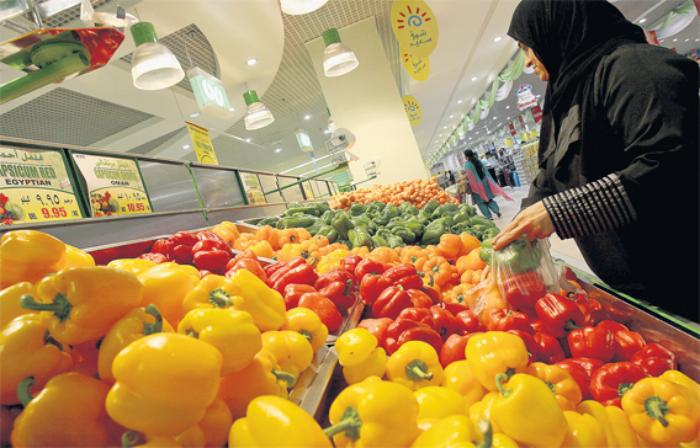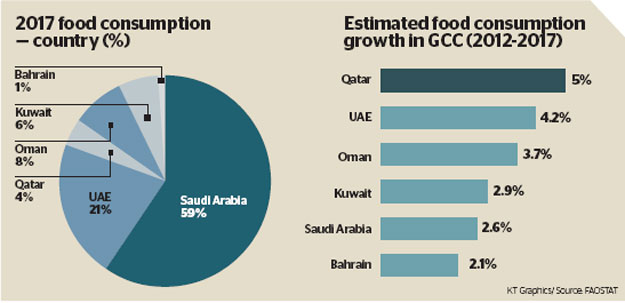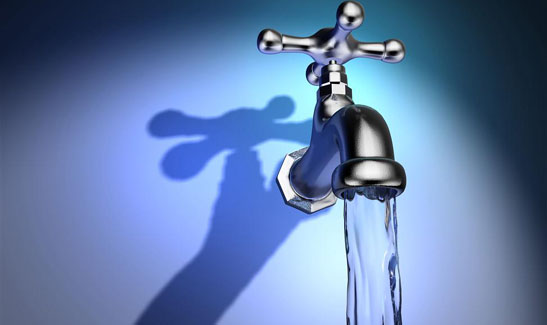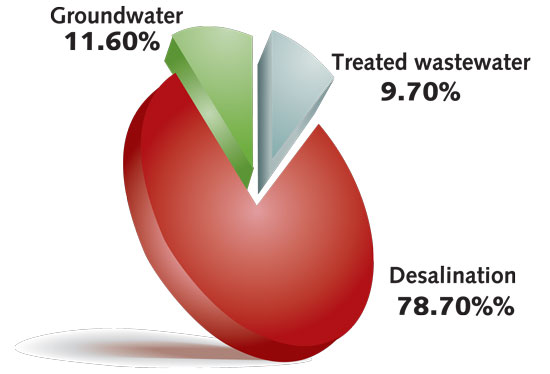Food Security

The UAE is one of the countries that suffers from water scarcity, because of it they cannot support a domestic agricultural sector that is able to support their population. Thanks to energy resources and financial wealth allow the country to meet their foo and water security through desalination and trade. The UAE was ranked 30th in the world, according to a recent Global Food Security Index. Which shows that the country is doing well when it comes to food security, but for how long?
Demand:
The UAE’s population is of 9.34 million people and it is predicted to reach 11.5 million by 2025. This will only put more pressure on the country’s food and water resources. The food value of $3 billion in 2011, is predicted to reach $8.4 billion in 2020. There are issues with the waste in food and over-consumption further increase their food demand. The UAE has one the highest obesity rates in the world, in part due to a shift towards a globalized diet which begun after the discovery of the oil wealth. There is a high demand for processed western foods.

Supply:
Only 6.5% of UAE’s land is fitting for farming and it is very hard to produce economically usable crops in such dry, extreme heat, low rainfall, and dessert soil conditions. The agricultural sector in the country only contributes to 3% of the country’s GDP and employs 3% of the labor force. The country’s major crops are: dates, tomatoes, cube cumbers and eggplants. The UAE is close to being self-sufficient when it comes to fruit and vegetable production, they also produce sufficient eggs, poultry, fish and dairy products to meet their needs. However, the things they are able to produce are not enough to meet the dietary needs. That is why the UAE relies heavily on the imports of grain, meat, sugar, and edible oil. Their main food sources are: India, the United States, and Brazil.
There are 3 aspects to food security: Availability, affordability and accessibility. Because of the limitations the UAE has when it comes to agricultural production, their biggest challenge is availability. The country is not able to produce the food they need, nor the quantity they need. However, food security does not solely depend on domestic production of food. A strong oil industry and their high levels of per capita income mean that the UAE can afford to maintain a trade-based food security.
UAE’s Food Security Strategy
In the year 2010, the UAE established the Food Security Center in Abu Dhabi to support implementations of the emirates’ food security strategy. The government also gives their support to various food security forums, like the World Food Security Summit.
Self Sufficiency Strategy
The UAE’s food security strategy has an aspiration towards agricultural self-sufficiency. Their government has invested in a big way towards the agricultural sector by giving technology required to improve land management. Part of the strategy is to invest in modernizing irrigation. Technology for water conservation has been provided to more than 6,200 farms since 2009 and irrigation systems have been improved in another 1,200.
International Agricultural Investment
One of the UAE’s key policies to the improvement of food security was to secure import sources by engaging in offshore farming contracts. Investments in overseas agriculture is directed to increase food supply and to secure that if there is any crisis, the UAE has a guaranteed import source. Also, the UAE has bought thousands of hectares of cheap farmland, which gave them direct access to massive food production bases. The UAE has now shifted their focus from their international investment strategy and has instead begun investing in landholdings in agro producing regions like Eastern Europe, North and South America, and Australia.
Water Security

Water in the UAE is very short supply. The country is one of the top 10 most water scarce countries in the world, and on top of that, it has one of the highest per capita water usages worldwide. They consume 550 liters per day, one UAE resident consumes more than the global national average which is 250 liter per day.
The UAE is experiencing a fast increase in population, which has increased the demand of water. In 2009, the water demand in the UAE was an estimate of 4.5 billion m3, which was met by groundwater, desalinated water and retreated water.
According to the UN (United Nations), for a country to be defined as “water scarce” is if it has 1000 cubic meters of water or less available per capita, per year. The country’s natural water supply is less than half this level, which puts the UAE as one of the world’s most water scarce countries.

Water Management
Water consumption in the UAE is divided, primarily, among three sectors:
Private Household Sector
This sector accounts for 24% of the total water consumption in the UAE. One of the biggest reasons for water consumption is the usage of air conditioning, which is used almost everywhere because of their high temperatures throughout most of the year. Air conditioning not only uses big amounts of energy, but also a large quantity of water via chilled water pumps. Also, the UAE has one of the highest per capita consumption of bottled water of 285 liters per year. The water used for bottle water is mostly desalinated water, which has a cost of 11.8 billion AED annually.
Agricultural Sector
This sector is responsible for 2/3 of all water consumption in the Emirates. As stated before, the UAE is experiencing rapid population growth, which increases a demand on food leading to an increasing demand on water. One of the largest issues to water being wasted is very low irrigation efficiency. 30% ,of the 12 to 15 liters it takes to water 1 m2 of land on a daily basis, is wasted due to evaporation when using a traditional irrigation techniques, like scary irrigation.
Of course now, the country has taken steps forward to fight this crisis. First they have implemented new irrigation methods that are much more efficient, like drip irrigation, which uses 35% less water than the previous traditional systems. Also, the UAE has moved aways from crops that require a lot of water.
Industrial Sector
The Industrial sector consume about 9% of all water consumption in the UAE. The majority of the water is used to cool and clean impurities of machinery. The emirate government has taken steps to use the waste water from the industry sector. An example is Abu Dhabi, a total of 600 million m3 of treated wastewater is produced yearly, but only 352 million m3 is used for landscaping. The wastewater from this sector will need to have a more prominent role in all of the three sectors.
Water Security Strategy
Self Sufficient Strategy
The investment into modern irrigation systems is part of a strategy to reduce by half the use of water in the agricultural sector. Reducing water in the agricultural sector is a huge goal and also improving the activity of the sector, makes the UAE less prone to crisis. Although the methods being implemented are very expensive, and there is also an environmental impact with the over extraction of groundwater, because even if better technology is used, it could lead to a disaster in the long run.
Bolstering Water Supply
The UAE has created the “Water Council” to supervise and coordinate integrated water management plans. The Council’s strategy for the conservation of water, provides a framework to manage the country’s water to 2021. Infrastructure development has occurred in the water sector, there has been construction of recharge dams, desalination plants and waste water treatment facilities.
Conclusion
The UAE’s food and water security are defined by abundances achieved through desalination and trade and by domestic scarcity. Although the UAE has a very low water supply and a very weak agricultural sector, it is still comfortable in the food security sector. Even though, the country is not having major issues now, it still faces challenges to come; because of their reliance on artificial and external food an water sources, it makes the country vulnerable. It is safe to say that the UAE will not be food sufficient in a long time or maybe never and renewable water source shortages are guaranteed.
Sources:
- https://www.linkedin.com/pulse/understanding-uae-food-security-strategy-potential-related-gueganic
- http://www.ft.com/intl/cms/s/0/076d6930-34d3-11e3-8148-00144feab7de.html#axzz41Eo3xTRx
- http://gulfnews.com/business/sectors/features/investing-abroad-to-secure-food-at-home-1.773464
- http://www.ecomena.org/tag/water-scarcity-in-uae/
- http://www.ecomena.org/water-management-uae/
- https://www.linkedin.com/pulse/understanding-uae-food-security-strategy-potential-related-gueganic
First of all, that was one of the most interesting blogs that I have ever read.
Like other MENA region countries, the United Arab Emirates is one of the countries that are struggling from water scarcity. The country geographically mainly made up of desert. Therefore, the country is not being able to produce its own food. In fact, the country is heavily relying on imported food. Good for the country, it has a very high oil reserve and tourism income. Therefore, unlike many other MENA region countries, UAE has a lot of money that can use to feed its people.
It is better to the United Arab Emirate to export food since water is more valuable than the growing food in this country. It is a very good idea for the country to get benefit from the idea of comparative advantage. It should focus more in diversify its economy and to improve the industrial sector more than producing their own food. When the economy of this country is strong, it is going to be able to meet the food needs of its population.
LikeLike
Wow this was a very informative and well put together blog post. The UAE and the other GCC countries are experiencing very similar water and food security issues due to the lack of fertile land and fresh water. Desalination and importing water are really their only options to obtain fresh water for their people to use and luckily the GCC countries have enough money from oil to supply their population.
I am very surprised to hear that the UAE has the highest per capita consumption of bottled water in the world. Initially it makes sense and it is not surprising that most of the water they drink is bottled however their population is extremely small especially compared to places like the United States. I just cannot believe that they consume more bottled water than anyone. It does not seem like they understand the severity of their situation.
LikeLike
This was a great blog. It reminded me of a website that you can go on to find out everything about the country. It had a lot of information but information that was of value to the topic and blog as a whole. I think that it was very smart of them to have a UAE “water council” in order to supervise and organize water management plans. Although they aren’t doing that great in the food & water security, this is a way that can help them keep stable. And what I also enjoyed reading about was the fact that the government has invested time in a big way towards the agriculture sector by giving technology required to improve land management. Overall this was a great blog and I would love to check back in to learn more about it.
LikeLike
The amount of detail put into this post was amazing. You have put in a great amount of effort in explaining everything that has to do with food and water security in the U.A.E. the charts and the graphs also made the pot more enjoyable to read. great idea with bold headers of the subtopics then going into detail with explaining the issues U.A.E is dealing with. You also picked out a great video which went into great detail to sum up the water problems the region is experiencing. One of the best blogs i have read so far keep it up!
LikeLike
I think UEA is one of the leading countries in the MENA that has a precise long lasting investment in their food and water management. They are a great example for other countries who lack the ability to manage their own resources. You did a great job in explaining in detail their current situation, and their future planning to combat food and water shortage.
LikeLike